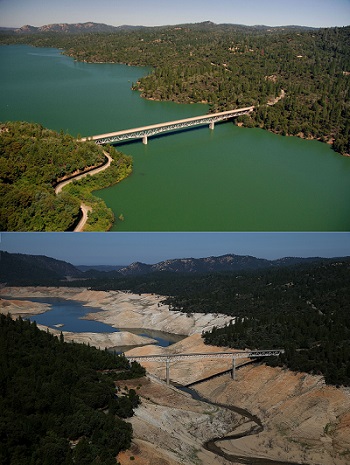Will California's drastic drought measures make a difference?
California is in the midst of its worst drought ever recorded, and Gov. Jerry Brown is taking unprecedented action by mandating limitations on the state's water use.
However, according to CBS News contributor and CUNY physicist Michio Kaku, Brown's measure may not be enough to make a difference.
"We have to understand why we are having this drought to begin with. There's an 800-pound gorilla in the living room. It is high pressure system sitting on California for four years, deflecting cold air from the Arctic and pushing it into New York City and the Northeast. We have excess snowfall in the Northeast in part because it should have fallen in California," Kaku said Thursday on "CBS This Morning."
Some meteorologists would say this is part of a natural cycle, he said.
"It comes and goes over a period of years, maybe decades," Kaku said. "But last month in Stanford University, some renegade meteorologist said, 'No, it's global warming.' The combination of hot air and dry air is very unusual, and they were saying it's man-made activity that's driving this. This is controversial."
As CBS News' Omar Villafranca reports, Gov. Brown's plan to cut overall water use by 25 percent will include replanting 50 million square feet, or 900 football fields worth, of California lawns with landscapes that don't need a lot of water.
Golf courses, cemeteries and campuses will have to reduce their water usage, and Brown is asking water agencies to raise rates on customers to discourage waste.
Brown's mandate does not affect farms that use most of California's water, however.
Frank Gehrke with California's Department of Water Resources went to the Sierra Nevada Mountains to measure what's left of the winter snow. For the first time in his 30-year career, there was none.
"This is bad news in terms of the state's water picture," Gehrke said.
The April snowpack in the mountains was measured at more than 15 inches in 2012. In 2013, the official measurement found almost 49 inches of snow, and the 2014 snowpack was more than 12 inches.
The snowpack provides a third of California's water supply, but this year, surveyors are seeing a record-low snowpack of just 5 percent.
The drought is draining the state's reservoirs, leaving bridges once providing easy passage over massive bodies of water, now towering over exposed rock. In Yosemite, park officials say the cascading water over the falls could slow to a drip by June. Researchers say it will take 11 trillion gallons of water to recover. To fight the drought, the state will also spend more than a billion dollars to recycle waste water and fund desalination plants like the Carlsbad facility near San Diego.
"Desalination sounds great. You essentially push water through a filter, and extract out the salt and, voila, you get fresh water," Kaku said. "However, it is very energy intensive because you have to use oil to create the machines to drive the water through a filter."
In the short term, the governor said every bit of conservation helps.
"Turning off that faucet a little quicker, getting out of the shower a little faster, and not flushing the toilet every time," Brown said.
In January 2014, Brown urged voluntary conservation to reduce water use by 20 percent.
"It failed. It went down 9 percent. That's why mandatory cuts are now in place," Kaku said.
